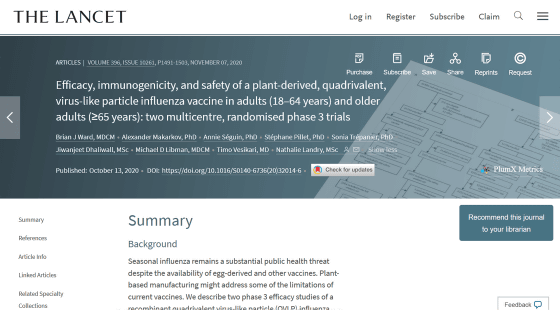'Plant-derived influenza vaccine' has appeared, and its effectiveness has been confirmed in large-scale clinical trials

Many people should be vaccinated against the flu vaccine in the fall to protect themselves from the flu epidemic every winter. A Canadian research team that developed a ' plant-derived influenza vaccine ' reported that it had conducted the world's first large-scale clinical trial to confirm the effectiveness of the vaccine.
Efficacy, immunogenicity, and safety of a plant-derived, quadrivalent, virus-like particle influenza vaccine in adults (18–64 years) and older adults (≥65 years): two multicentre, randomized phase 3 trials --The Lancet

First human efficacy study of a plant-derived influenza vaccine --ScienceDirect
https://www.sciencedirect.com/science/article/pii/S0140673620320109
First-Ever Flu Vaccine Derived From Tobacco Plants Just Smashed Clinical Trials
https://www.sciencealert.com/large-scale-studies-test-flu-vaccine-derived-from-tobacco-plants-for-the-first-time
Due to the large number of types of influenza virus and the rapid mutation of proteins, a new influenza vaccine must be given annually. Every year, researchers anticipate the type of influenza virus that will prevail in the next season and produce vaccines for the virus.
At the time of writing, the chicken egg culture method was commonly used in the production of large-scale influenza vaccines. This is a method of producing a vaccine by injecting influenza virus into chicken eggs, culturing and purifying it, but in recent years, it seems that a culturing method using plants has been devised.
A Canadian research team said that a plant called Nicotiana benthamiana , a closely related species of tobacco, was infected with a genetically engineered agrobacterium to produce a protein inside the plant that resembled the outer shell of the influenza virus. That thing. Agrobacteria are used in plant biotechnology research because they have the property of infecting plant cells and delivering DNA.
Next, the research team created a plant-derived influenza vaccine by extracting influenza virus-like particles from the leaves of Nicotiana benthamiana and purifying them under the same conditions as when making the vaccine. This time, the influenza vaccine made from plants is a 4-valent influenza vaccine with many target virus strains.

To see the safety and efficacy of plant-derived influenza vaccines, the research team conducted a large phase III clinical trial in two separate sessions. The first clinical trial, conducted before the 2017-2018 flu season, included a plant-derived flu vaccine in more than 10,000 people aged 18-64 in Asia, Europe, and North America. A placebo was administered.
As a result of clinical trials, the plant-derived influenza vaccine elicited an immune response in the body of the subjects, and 35% of the subjects were confirmed to have a protective effect from respiratory diseases such as influenza. This did not reach its original goal of 70% efficacy, but the researchers claimed it was more effective than the flu vaccine given in the United Kingdom at the same time. The researchers also note that the effectiveness of the influenza vaccine is affected by the strains of the influenza virus that prevail during the season, resulting in large annual variability.
In the second clinical trial conducted before the 2018-2019 influenza season, more than 12,000 elderly people aged 65 and over were given a plant-derived influenza vaccine and an influenza vaccine made from chicken eggs. Was administered and the efficacy of each was compared. In this clinical trial as well, the result was that 'the effectiveness of the plant-derived influenza vaccine is comparable to that of the chicken egg-derived influenza vaccine.'

According to the research team, plant-derived influenza vaccines can be manufactured within two months of selecting the virus strain. John Tregoning, an infectious disease researcher at Imperial College London , commented on the study, saying that developing a plant-derived flu vaccine is important in solving problems with chicken-egg-derived flu vaccines. I point out.
The problem with chicken egg-derived influenza vaccines, Tregoning points out, is that the influenza virus adapts to chicken cells during the process of culturing eggs, which changes the antigenicity of the vaccine. is. This phenomenon, also known as 'egg acclimation,' also affects the efficacy of influenza vaccines, so the development of alternative vaccine production methods is an important issue.
In addition, 'If a bird-derived influenza epidemic may affect the egg-derived vaccine production method,' 'in the event of a large-scale pandemic, the egg-derived vaccine production method alone will require the required amount. The problem that 'it may not be possible to cover the problem' may be solved by the plant-derived influenza vaccine.
'This is the first time a plant-derived vaccine has been tested in clinical trials, which is a major milestone in technology and will sow other plant-based vaccines and treatments,' said Tregoning. Meanwhile, science alert Science Alert argues that plant-derived influenza vaccines are likely to take a long way to get regulatory approval and will not be put to practical use immediately. Did.

Related Posts:







